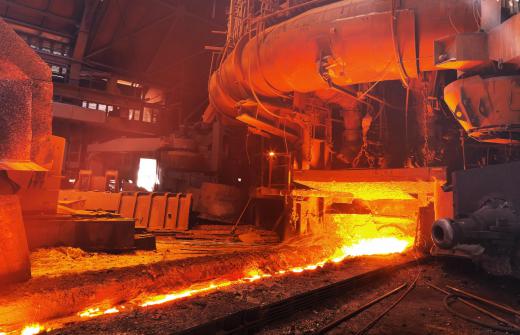From aluminum to steel to zinc and iron, the world's metals are created in foundries. Foundry engineering is the profession revolving around designing new foundries. Engineers custom create a building made for heating raw materials to incredible temperatures in order to pour them into molds and create a product that can be sold. In addition, many foundry engineering jobs focus on repairing older foundries or making them more efficient in order to maintain a presence in the highly competitive field of metals.
Depending on the metal involved, every foundry is different, but they all share many of the same steps to reach completion of their end products. All foundries have a large furnace that reaches temperatures greater than 3,000 degrees Celsius (5,432 degrees Fahrenheit) in order to melt raw metal or scrap metal. When metal reaches a liquid state, it is poured into a mold that can range from that of a steel beam's shape to large blocks and many other designs. The metals are finished by grinding or sanding in order to achieve the correct dimensional shape. Foundries also have a large dock area for shipping via trains and trucks.

A foundry engineering firm works to design and build a functioning facility to replicate this process while also meeting the individual needs of the client. Engineering and foundry experts consult one another to determine the desired quantity and type of metal to be made in order to build a proper foundry. Foundries can have multiple furnaces, bucket conveyor systems for transporting liquid-hot metals, various mold-building stations, cooling locations and storage facilities. Engineers work with foundry owners and local zoning laws to design the building.
Foundry engineers build only the structures for foundries. They traditionally do not construct the metal-forging machinery that is used in the foundries. That machinery is purchased from a third party.
The second half of foundry engineering lies with construction. Some engineering firms have a construction crew or hire a construction company to build the foundry. Engineers work with construction foremen to plan and construct the facility from start to finish.
Another service of foundry engineering is repairing and improving existing foundries. Older foundries often need serious repairs or simply are in need of becoming more efficient. Foundry engineers look at the current setup and structure and determine solutions to meet the customer's needs within the current facility.
